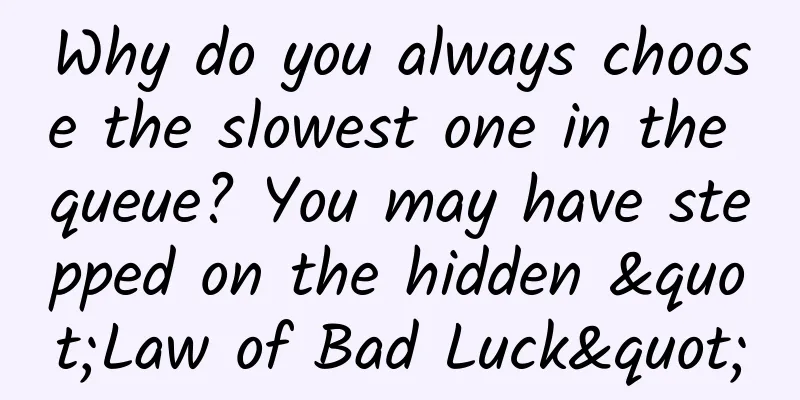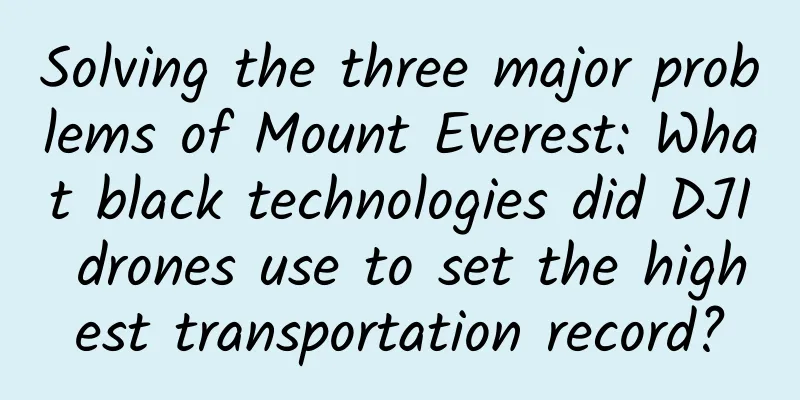Why do you always choose the slowest one in the queue? You may have stepped on the hidden "Law of Bad Luck"

|
Have you ever had this experience: you see the team next to you moving forward quickly, but your team is always moving slowly as if it were under a spell? Whether it's supermarket checkout, airport security check, or cafeteria food, it seems that you can always "lucky" to choose the slowest team. The most puzzling thing is that when you switch to the team you think is faster, the original fast team will also become slower. Is it just bad luck, or is there some scientific reason behind it? Today, we're going to uncover this ridiculous "queue mystery" and find out why your queue is always the slowest ! The team is slow, maybe it's a psychological effect Take queuing up to check out at a supermarket as an example: it is possible that some individual cashiers are exceptionally slow, but most of the time, the checkout speed at each window is not very different. When people are queuing, they tend to calculate in advance, compare the amount of goods in the shopping carts of the people in front of them, and then choose a relatively suitable queue to queue in. As a result, even if the queue is very long, it is rare that "one queue has a lot of goods, and the other queue has very few goods." Therefore, except for extreme cases, getting in the "fast queue" is more of a matter of probability . If there are five queues in a mall, your probability of getting in the fast queue is only "one in five". When there are more queues, this probability will be further reduced. Copyright images in the gallery. Reprinting and using them may lead to copyright disputes. On the basis of probability, you may also be affected by " survivor bias ", which is a common logical fallacy. It is often the very few survivors that are easy to be noticed, and when you only focus on this small sample and ignore the key information hidden behind the sample, the conclusion you get may not be consistent with the actual situation. The fastest team is one of the few "survivors". At the same time, there is only one fastest team. Whenever you notice that other teams are getting faster, you will be particularly sensitive to this signal. After a few times, your cognition will slowly accumulate, giving you the illusion that "your team is slow most of the time". If you look at it from a bird's eye view, you might find that these teams are actually about the same speed. "My team slows down when it's my turn" It's a wrong connection In addition, the false correlation effect will also deepen the association that "once it's my turn, the queue slows down." The false correlation effect, also known as illusory correlation , means that when you expect to find a connection between certain things, you will easily connect various random events. It has two triggering factors, one is people's pre-existing stereotypes, and the other is the commonality of two events in some aspect (such as time). The premise of "your queue" and the result of "the queue will slow down" are also a false causal relationship. It may be that the queue slowed down temporarily just because a customer who bought a lot of goods happened to be in front of you, but due to the stereotype and the close time of the two events of "your turn soon" and "the queue slowed down", you ignored other possible factors and subconsciously attributed the slowing down of the queue to the wrong cause. Similarly, it will rain if you don’t bring an umbrella and you will be called out if you skip class, which is also a false association. The hard part is not the queue, but the waiting In fact, feeling that queues are slow and waiting is unbearable is a common trait among people all over the world. Twenty years ago, managers at the Houston Airport in the United States were troubled by the tense relationship between passengers and the airport. In the feedback form, many people were dissatisfied with the long queue time. In fact, the airport had made many efforts, such as arranging baggage handlers, to shorten the queue time to 8 minutes, which was lower than the general industry standard. The administrators analyzed the route that passengers took to pick up their luggage and found that it only took one minute to get from the entrance to the luggage station, but it took seven minutes to queue up to get the luggage. They changed their thinking and increased the distance between the entrance and the luggage station, which greatly reduced the waiting time, and the complaints were indeed reduced a lot. The total time did not change, so why did the result change? This is because the key to the problem is not queuing, but "waiting". An experiment conducted by MIT showed that people think they spend 36% more time in line than they actually do . When people are bored or in pain, they subconsciously feel that time is stretched out. As the saying goes: happy times are always short. The weekend is gone before you can have much fun, and half a day at work feels like a year. Copyright images in the gallery. Reprinting and using them may lead to copyright disputes. The correct posture for queuing Based on this, David Masters, a professor at Harvard Business School, proposed 10 widely recognized principles of waiting in line. 1. Waiting with nothing to do feels longer than waiting with something to do. 2. When waiting for service, the perception of time is longer than when receiving service. 3. An anxious mindset will make the wait seem longer than it actually is. 4. Waiting for a clear result is worse than waiting for an uncertain result. 5. Waiting without explaining the reason is longer than waiting with explaining the result. 6. An unfair wait is longer than a fair wait. 7. The higher the value of the service, the longer people are willing to wait. 8. It is better to wait together than to wait alone. 9. When you are not feeling well, the wait becomes long. 10. In an unfamiliar environment, waiting will also be long. These waiting psychology have been applied in many occasions. For example, some theme parks will add some interactive links when queuing, so that everyone can spend time in fun cooperation; and at different positions in the queue, real-time reminders of how long it will take to wait; and only a long serpentine queue is arranged, and a person is set up in front of each window to guide the next person in line to receive service at the window that is about to be vacated. This can reduce comparisons and reduce the problem of different speeds of each queue caused by objective conditions. For us, there are some tips to make the queue less unbearable. Here we must make it clear that queuing is an inevitable measure for a civilized society to ensure fairness, so we must prepare for this matter in advance. Tips to make the queues less long: Play mobile games: download a small game that can be finished in a short time; Observe your surroundings and play a "small challenge": you can observe the people in line, guess their occupations and destinations, or even silently count how many times a certain color of clothing appears, giving yourself some small tasks to do; Chat with friends: You can also share interesting queue stories or chat with friends while waiting to avoid boredom; Use your time to handle small tasks: You can use the waiting time to reply to messages, sort out your to-do list, plan your day, or even think about your next shopping list in advance, making waiting more efficient; Move your body appropriately and relax: Standing for a long time may make you feel uncomfortable. You can tiptoe slightly, turn your ankles, and adjust your standing posture. This can not only relax your body, but also prevent you from paying too much attention to the waiting time. Of course, it is worth noting that these special queue plans can be interrupted at any time and do not require high concentration. This can not only make it convenient for you to pay attention to the queue progress at all times without being frequently reminded by the people behind you, but also avoid the embarrassing situation of having to quit when it is your turn and being scolded by teammates because a new game just started. References [1]Wald, Abraham. (1943). A Method of Estimating Plane Vulnerability Based on Damage of Survivors. Statistical Research Group, Columbia University. [2]Wallis, W. Allen (1980). "The Statistical Research Group, 1942-1945: Rejoinder". Journal of the American Statistical Association. 75 (370): 334–335. doi:10.2307/2287454 [3]Pelham, Brett; Blanton, Hart (2013) [2007]. Conducting Research in Psychology: measuring the weight of smoke (4th ed.). Belmont, CA: Cengage Learning. pp. 11–12. [4]Peeters, Vivian E. (1983). "The Persistence of Stereotypic Beliefs: a Cognitive View". In Richard P. Bagozzi; Alice M. Tybout (eds.). Advances in Consumer Research. Vol. 10. Ann Arbor, MI: Association for Consumer Research. [5]Chapman, Loren J. (1967). "Illusory correlation in observational report". Journal of Verbal Learning and Verbal Behavior. [6]Plous, Scott (1993). The Psychology of Judgment and Decision Making. McGraw-Hill. [7]The 10 Principles of Waiting: What Makes Waits Feel Long? retrieve from [8]https://worldofwork.io/2019/06/10-principles-of-waiting/#:~:text=Key%20Learning%20Points%3A%20The%2010,or%20the%20product%20is%20cheap. [9]Why Waiting Is Torture retrieved fromhttps://www.nytimes.com/2012/08/19/opinion/sunday/why-waiting-in-line-is-torture.html Planning and production Author: Li Mi, popular science creator Reviewer: Fan Chunlei, Associate Researcher, Institute of Psychology, Chinese Academy of Sciences Planning丨Wang Mengru Editor: Wang Mengru Proofread by Xu Lailinlin The cover image and the images in this article are from the copyright library Reprinting may lead to copyright disputes |
<<: This is very "nuclear" | When Nezha turns into an atom, this "72" changes
Recommend
A powerful anti-inflammatory ingredient is hidden in this "golden seasoning"
Curry is really delicious! Curry chicken, curry b...
Why do onions, ginger and garlic have such magical powers to remove fishy smell and enhance fragrance?
Key Points ★ The flavor substances emitted from o...
If you always get acne on your scalp, chest and back, take this guide to fighting acne!
As the weather warms up, it's time to wear sh...
If all the seawater on Earth becomes fresh water, will human life be better? The blue planet may no longer have vitality
As we all know, the Earth on which we live is a v...
Ten years of WeChat, here is what Zhang Xiaolong taught us about product methodology!
WeChat Open Class: A Spring Festival Gala for the...
There are always inexplicable bruises on my body. What kind of inexplicable physical phenomenon is this?
Review expert: Zhang Yuhong, chief physician of t...
Use local traffic to build a project, earn 300,000+ yuan a year, full set of operation strategies
If you often browse the local short video platfor...
What to do if your sense of smell and taste are impaired after a positive test? 5 tips to quickly restore your sense of smell and taste
Smell the coffee: A foreign experiment was conduc...
Remember! Do not perform time-consuming operations in the UI main thread
question Since the release of Android Ice Cream S...
Moonlight: Let your phone play PC games
Nowadays, mobile games are becoming more and more...
How much is the investment price for the Hegang fast food mini program? Hegang fast food mini program investment price inquiry
How much does it cost to attract investment in th...
Why won't my iCloud photos sync with my Mac?
iCloud is a cloud service provided by Apple, whic...
Essential for overseas promotion: What are the global advertising channels?
AppsFlyer breaks down data by industry verticals ...
Don't ignore these little things in life, they may quietly "steal" your mental health
In modern society, people's pace of life is g...









